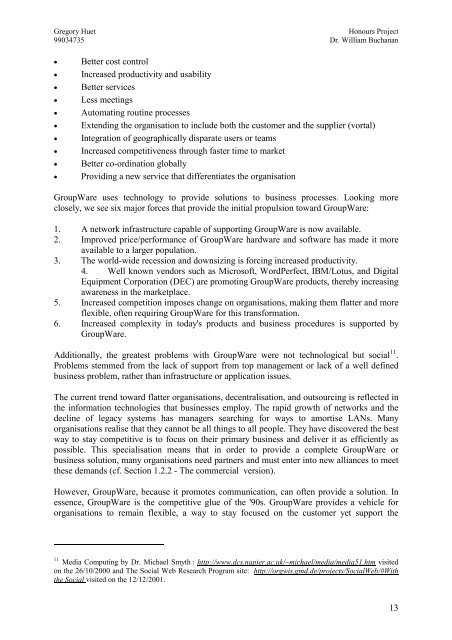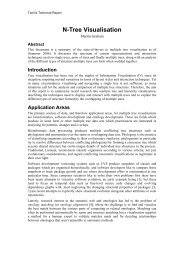Honours Project: - Napier University
Honours Project: - Napier University
Honours Project: - Napier University
You also want an ePaper? Increase the reach of your titles
YUMPU automatically turns print PDFs into web optimized ePapers that Google loves.
Gregory Huet<br />
<strong>Honours</strong> <strong>Project</strong><br />
99034735 Dr. William Buchanan<br />
• Better cost control<br />
• Increased productivity and usability<br />
• Better services<br />
• Less meetings<br />
• Automating routine processes<br />
• Extending the organisation to include both the customer and the supplier (vortal)<br />
• Integration of geographically disparate users or teams<br />
• Increased competitiveness through faster time to market<br />
• Better co-ordination globally<br />
• Providing a new service that differentiates the organisation<br />
GroupWare uses technology to provide solutions to business processes. Looking more<br />
closely, we see six major forces that provide the initial propulsion toward GroupWare:<br />
1. A network infrastructure capable of supporting GroupWare is now available.<br />
2. Improved price/performance of GroupWare hardware and software has made it more<br />
available to a larger population.<br />
3. The world-wide recession and downsizing is forcing increased productivity.<br />
4. Well known vendors such as Microsoft, WordPerfect, IBM/Lotus, and Digital<br />
Equipment Corporation (DEC) are promoting GroupWare products, thereby increasing<br />
awareness in the marketplace.<br />
5. Increased competition imposes change on organisations, making them flatter and more<br />
flexible, often requiring GroupWare for this transformation.<br />
6. Increased complexity in today's products and business procedures is supported by<br />
GroupWare.<br />
Additionally, the greatest problems with GroupWare were not technological but social 11 .<br />
Problems stemmed from the lack of support from top management or lack of a well defined<br />
business problem, rather than infrastructure or application issues.<br />
The current trend toward flatter organisations, decentralisation, and outsourcing is reflected in<br />
the information technologies that businesses employ. The rapid growth of networks and the<br />
decline of legacy systems has managers searching for ways to amortise LANs. Many<br />
organisations realise that they cannot be all things to all people. They have discovered the best<br />
way to stay competitive is to focus on their primary business and deliver it as efficiently as<br />
possible. This specialisation means that in order to provide a complete GroupWare or<br />
business solution, many organisations need partners and must enter into new alliances to meet<br />
these demands (cf. Section 1.2.2 - The commercial version).<br />
However, GroupWare, because it promotes communication, can often provide a solution. In<br />
essence, GroupWare is the competitive glue of the '90s. GroupWare provides a vehicle for<br />
organisations to remain flexible, a way to stay focused on the customer yet support the<br />
11<br />
Media Computing by Dr. Michael Smyth : http://www.dcs.napier.ac.uk/~michael/media/media51.htm visited<br />
on the 26/10/2000 and The Social Web Research Program site: http://orgwis.gmd.de/projects/SocialWeb/#With<br />
the Social visited on the 12/12/2001.<br />
13










![Unit 5. Switches and VLANs [PDF]](https://img.yumpu.com/34422504/1/184x260/unit-5-switches-and-vlans-pdf.jpg?quality=85)





